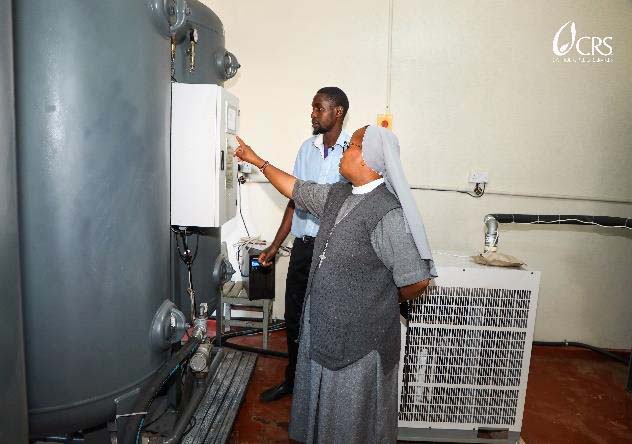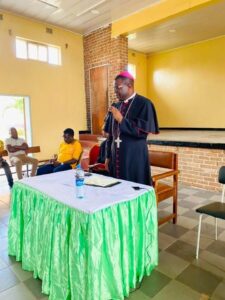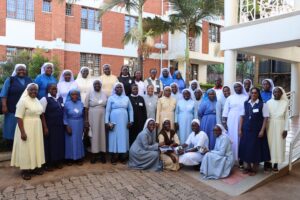KENYA: CRS Elated By Success of SCORE ECD Project with Consecrated Women

Sr. Mary Agnes Nkatha, CEO for St. Theresa Mission Hospital inspecting the Oxygen plant. Credit: CRS
Sr. Jecinter Antoinette Okoth, FSSA
Members of the Catholic Relief Service (CRS) working in Kenya are delighted by the success being realized by Religious women through an initiative dubbed ‘Strengthening Capacity of Religious Women in Early Childhood Development’ (SCORE ECD).
The SCORE ECD project which began in 2014 is currently in its third phase (2021-2024) and engages a total of 29 Sisters’ congregations through the Association of Consecrated Women in Eastern and Central Africa (ACWECA) and Catholic sisters’ national associations in Kenya, Malawi, Ghana and Zambia with the aim of increasing technical capacity of the sisters in ECD, organizational sustainability, networking, and learning around ECD.
In a message shared by the CRS Project Coordinator for SCORE ECD Projects in Kenya, Malawi, Ghana and Zambia, Sr. Pauline Silver Acayo highlighted that among other objectives, SCORE ECD “supports the National Associations and Congregations of Catholic Sisters (NACCS) to strengthen their organizational capacity to ensure a sustainable institution and continue positioning the NACCS as influential leaders in early childhood at the national level.”
Based on this objective as one of the areas of priority for the project, a congregation in Kenya called Little Sisters of St. Theresa’s Child Jesus has initiated how to produce oxygen for use at St. Theresa Mission Hospital in Kenya’s Meru Diocese for sustainability purposes.
In the message by Sr. Acayo, the Chief Executive Office for the hospital Sr. Mary Agnes Nkatha has been quoted to have said, “We recently set up a plant that produces more than 100 liters per minute to reduce the costs of buying oxygen… We have come to understand that building the oxygen plant is one step toward sustainability and self-reliance.”
“Oxygen is an extremely scarce commodity; for example, 6.8 cubic meters of oxygen enough to sustain one adult for 24 hours costs over $100. Many Kenyan hospitals use oxygen concentrators, which remove nitrogen from the air instead of drawing from an oxygen cylinder,” Reads the message from the CRS official.
It continues, “However, unlike gas cylinders, which can serve an entire ward of patients, an oxygen concentrator can only serve a single patient and is prone to malfunction. One of the cost-cutting initiatives undertaken by the hospital for sustainability is the production of their own oxygen.”
Besides the oxygen plant, the congregation has gained on various trainings including resource mobilization, Human Resource Management, Networking and Partnerships offered by CRS through the financial support of Conrad N. Hilton Foundation which the Religious women are making good use of.
“The journey towards resource mobilization and enhancing sustainability started with institutional capacity assessment. We did a holistic assessment using the Holistic Organizational Capacity Assessment Instrument (HOCAI) tool developed by CRS. After the assessment, several gaps were identified, and we immediately embarked on addressing those gaps with support from CRS and Association of Sisterhoods in Kenya (AOSK), to position the organization for self-sustainability,” Sr. Nkatha is quoted to have said.
In general, “The increased financial sustainability of Sisters’ congregations adds in building the skills of sisters to deliver nurturing care to caregivers of children aged 0-3 years,” reads the message in parts.


